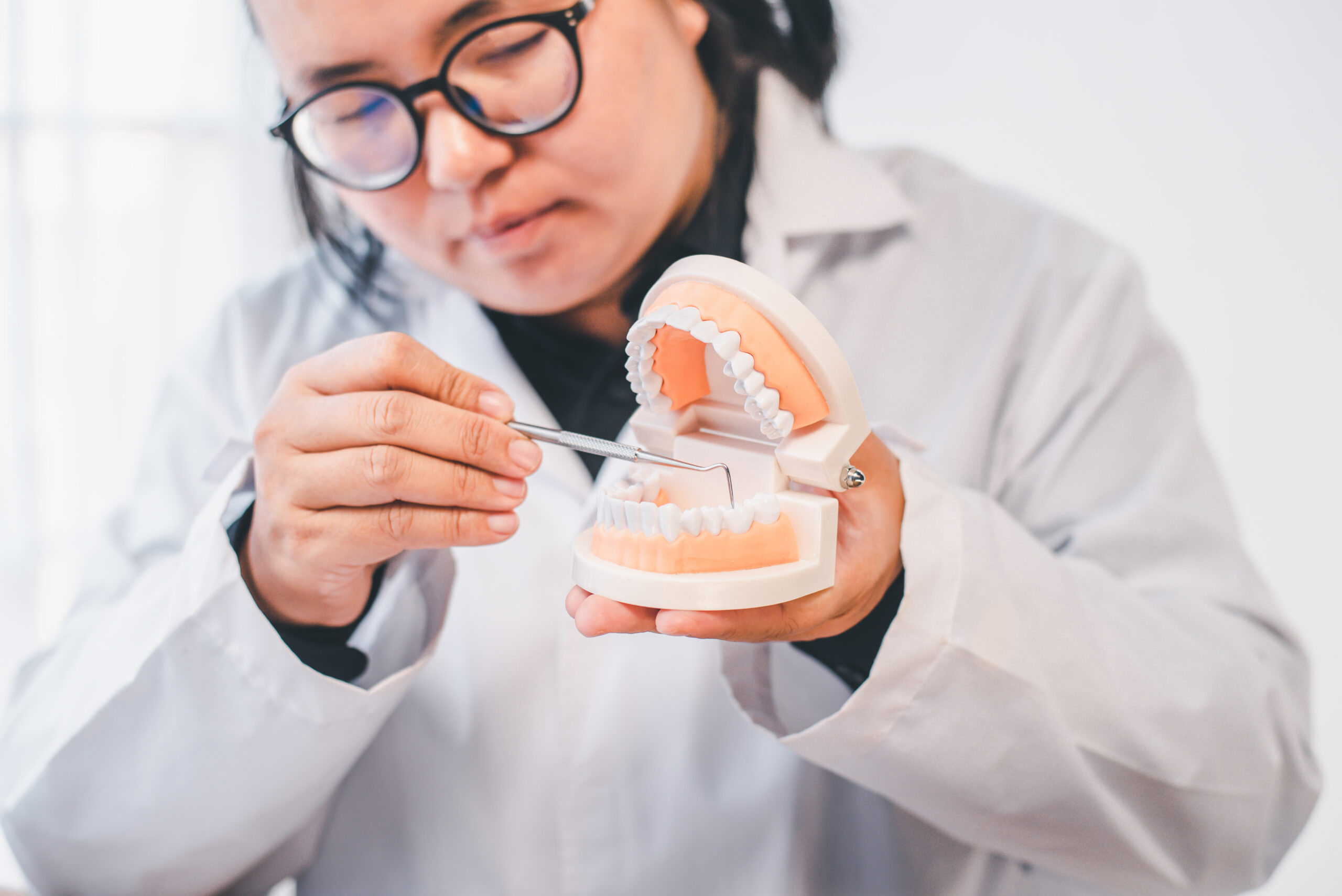Understand full denture fabrication
When you think about replacing missing teeth and restoring your smile’s vitality, full denture fabrication is a primary solution to consider. This comprehensive process involves designing custom-fitted dentures that can significantly enhance your quality of life. Whether you have experienced tooth loss over time or are looking for a more aesthetic enhancement, understanding the essentials of fabricating full dentures can empower you to make the best decisions for yourself or a loved one.
If you are seeking a blend of high-tech dentistry, comfort, and aesthetic appeal, Vivid Dental Raleigh provides specialized full denture services that address your individual needs. Our team blends modern technology with an empathetic approach, always aiming to help you overcome any concerns you might have about dentures. In the following sections, you will learn the vital elements that define full denture fabrication, the materials involved, the step-by-step procedures, and how our practice ensures you have a supportive environment every step of the way.
Explore common denture materials
Choosing the right material for your dentures can play a pivotal role in achieving a comfortable fit, a natural look, and an enduring result. You may be surprised by just how many different materials are available.
-
Acrylic
Acrylic—the most common denture material—has been a go-to resource for decades (Denture Haus). It is cost-effective, easy to customize, and typically provides a comfortable fit in your mouth. Many patients find that acrylic dentures adapt well to their gums, and adjustments are straightforward if changes are needed. However, like any dental prosthetic, acrylic dentures require regular checkups to ensure they are in optimal condition. -
Porcelain
Porcelain is known for replicating the color and translucency of natural teeth. This option offers excellent durability and a high level of stain resistance (Denture Haus). However, porcelain can be somewhat abrasive on adjacent teeth. If you choose porcelain dentures, your dentist may check your bite and ensure minimal wear on surrounding structures. Porcelain dentures are often favored by those wanting a highly aesthetic look or who already have porcelain restorations in place. -
Metal frameworks
Metal, primarily cobalt chrome, is often used in partial dentures for a stable framework. These dentures are known for their good retention and durability (Denture Haus). In full denture fabrication, however, metal understructures can appear in specialized designs, particularly when additional support is needed. The key advantage is sturdiness, but some individuals find metal-based dentures heavier than traditional acrylic-based solutions. -
Flexible nylon
Flexible nylon dentures have gained popularity for their comfortable, flexible fit (Denture Haus). They are often considered for partial dentures but can also be used in certain full denture scenarios. Lightweight, durable, and less prone to breaking, these dentures move with the tissues of your mouth to provide a more natural feel. Because of their flexibility, some people find them easier to adapt to than rigid alternatives.
As you weigh your material options, it is crucial to communicate any aesthetic goals and lifestyle needs to your dental team. Our practice, Vivid Dental Raleigh, offers a range of solutions, always prioritizing your comfort, oral health, and personal preferences.
Compare analog and digital
Navigating your choices in denture production inevitably brings up the debate between analog (traditional) and digital processes. Understanding each method can help you make a well-informed decision.
Analog techniques
This is the time-tested approach wherein impressions, casting, tooth-setting, and finishing processes are performed manually (The Dental Lab Blog). Even in modern dentistry, analog techniques remain highly reliable. Dental professionals typically use stock or custom trays, capture physical impressions, and then pour models using dental stone. Tooth arrangement and wax-ups for try-in appointments are done by hand, allowing for detailed customization. For many patients, analog processes can yield excellent results, particularly when overseen by an experienced dental team attentive to minute aesthetic and functional details.
Digital approaches
Digital full denture fabrication has risen in popularity because it merges efficiency with precision. In digital dentistry, scanners capture impressions or models, and software then designs a 3D model of the denture. This model can be milled or 3D-printed to produce the final prosthesis (The Dental Lab Blog). One major advantage is reproducibility. The digital file of your dentures acts like a virtual blueprint, simplifying future remakes or modifications. Computer-aided design also cuts down on certain errors possible in analog processes, potentially reducing the number of visits required.
Ultimately, both analog and digital fabrication can yield high-quality results. The best approach for you will depend on your dentist’s expertise, your budget, and your personal preferences. At Vivid Dental Raleigh, we offer both techniques to suit a wide range of needs. We also discuss your lifestyle factors and digital comfort levels when helping you pick between analog and digital dentures.
Follow the denture process
The true core of your journey toward a new smile lies in the step-by-step process behind fabrication. While the timeline may vary, most patients can expect multiple visits to ensure the dentures are precisely customized to their mouths.
-
Initial consultation
Your journey begins with a comprehensive oral exam. During this step, we evaluate your overall oral health, take preliminary impressions, and discuss your goals. We might order digital xray diagnostics if needed. If any natural teeth remain that require extraction, we guide you through a tooth extraction service beforehand. -
Secondary impression
Once the initial stage is complete, a more detailed impression might be taken through a custom tray. This captures a precise replica of your gum ridges and jaw relationships. It is a pivotal step, ensuring your final dentures fit securely. -
Bite registration
In this stage, your dentist or prosthodontist checks your bite using wax rims. These rims replicate how your teeth will occlude in the final dentures, helping to establish correct vertical dimension. This step can also address aesthetic preferences, such as how your lips and facial profile will be supported. -
Wax try-in
Next, you will see a trial version of your dentures in wax, typically with the chosen denture teeth set in place. This is an opportunity to provide feedback regarding fit, aesthetics, or comfort. Adjustments continue until you approve the setup. -
Finishing
After finalizing details in the try-in stage, the dentures move into finishing and polishing. Technicians carefully remove any extra acrylic and ensure the surface is smooth (DDS Lab). If you have chosen a digital approach, the design may be milled or 3D-printed, then polished with specialized equipment. -
Delivery and adjustments
The final step is delivering your new dentures and making any necessary tune-ups. If sore spots appear or the dentures feel too tight, your dentist can identify the problem area and make targeted reductions. Many patients require a short adjustment period to adapt fully.
Depending on the complexity, this sequence takes about six weeks to three months (Denture Health Care). If your situation calls for immediate dentures, we can insert them promptly after an extraction session so you never go toothless.
Consider your future adjustments
Wearing dentures can feel liberating, especially when you can chew foods more comfortably and smile with confidence. Yet, even the most well-fitting dentures may require adjustments over time. As the underlying bone and sensitive tissues shift or resorb, the denture fit might become looser or cause pressure points. Relines or rebasings can solve these issues, renewing the snug fit and preventing complications.
For patients with an interest in greater stability, implant supported dentures are a transformative alternative. Small dental implants anchor to your jaw, providing a secure base for your prosthetic. You might also consider a snap in denture service if you prefer an easily removable solution that still offers enhanced retention. These modern solutions reduce the risk of slippage, especially when chewing or speaking, giving you confidence in your everyday activities.
Another possibility is partial dentures, which can replace multiple missing teeth while preserving healthy natural teeth. If your needs are more specific, our partial denture service supports partial tooth loss. We tailor each approach to your treatment goals, lifestyle habits, budget, and oral health conditions.
Choose Vivid Dental Raleigh
While the process itself is crucial for achieving a high-quality denture, the best outcomes are rooted in the care and expertise of your dental team. Vivid Dental Raleigh offers a supportive environment where you can receive comprehensive care. That supportive atmosphere goes beyond dentistry’s technical side. We combine empathy, modern technology, and thorough guidance—and strive to help you feel fully at ease through every step.
• High-tech solutions
From digital impression scanners to advanced milling and 3D printing tools, our embrace of modern technology contributes to improved speed, accuracy, and comfort. This advanced toolkit often shortens your treatment timeline, ensuring you can enjoy your new smile sooner than you might expect.
• Aesthetic focus
We understand that cosmetic satisfaction is significant. By prioritizing color matching, shaping, and even adjusting the position of individual prosthetic teeth, we create dentures that not only feel comfortable but also complement your facial features. Achieving a natural look is a point of pride for our practice.
• Comprehensive approach
At times, full denture fabrication may be closely linked with other treatments. In some cases, a dental implant consultation clarifies your suitability for implant-supported dentures. Other times, existing decay or periodontal issues might prompt a gum disease evaluation. Addressing these concerns early helps ensure a smooth rehab process, leading to a longer-lasting prosthesis.
• Supportive care
Our practice encourages you to share your concerns, ask questions, and speak openly about discomfort. If you need additional assistance, we also guide you in scheduling a comprehensive oral exam, professional teeth cleaning, or other follow-up services. In this way, your denture journey fits into a broader framework of ongoing oral health.
Manage common denture concerns
Adapting to dentures is a transformative process, but it can introduce a few challenges. Thankfully, most of these issues have straightforward solutions.
Soreness and pressure points
- Cause: Overextended denture borders or slight misalignment can lead to sore spots, especially around the vestibular area or posterior palatal seal (Glidewell Dental).
- Fix: If you experience persistent tenderness, your dentist can easily adjust the denture’s edges or occlusion. Often, a reline or a minor trimming can completely resolve the issue.
Phonetic difficulties
- Cause: Adjusting to dentures involves acclimating to subtle changes in your mouth’s shape, which can momentarily affect speech. Whistling on “S” sounds, lisping, or trouble pronouncing words clearly are not uncommon during the adaptation phase (Glidewell Dental).
- Fix: Reading aloud at home and practicing difficult words will gradually restore your usual speech patterns. If persistent problems arise, your dental team can adjust the thickness or contour of the denture’s base to improve tongue space.
Cleansing and hygiene requirements
- Cause: Like natural teeth, dentures accumulate plaque, food debris, and bacteria. Failure to follow a daily cleaning regimen can lead to oral health issues and foul odors.
- Fix: Establish a consistent cleaning routine that includes gently brushing your dentures, soaking them in a recommended cleaning solution, and brushing your gums or any remaining teeth. Routine checkups will also help your dentist to detect early signs of potential problems.
Bite issues
- Cause: Even perfectly fabricated dentures may shift slightly as your jaw and gums adapt, leading to an altered bite or mild discomfort. Premature occlusion in one area can trigger localized soreness (Glidewell Dental).
- Fix: Through occlusal adjustment, your prosthodontist can fine-tune the contact points so your bite feels natural and balanced again. Periodic checkups let your dental team identify these bite changes promptly.
Read these FAQs
Below are five of the most frequently asked questions about full denture fabrication. If you have additional concerns, do not hesitate to consult with Vivid Dental Raleigh for individualized recommendations.
-
“How long does it usually take to get full dentures?”
The timeline ranges from about six weeks to three months (Denture Health Care). You will typically attend several appointments for impressions, bite registration, and try-ins before receiving your final dentures. Immediate dentures may be provided the same day as a tooth extraction, but follow-up adjustments are often necessary to accommodate healing changes. -
“Are digital dentures really better than traditional ones?”
Both digital and analog approaches can produce high-quality dentures. The digital process may speed up production and enable easy future remakes, whereas the analog method provides a certain hands-on customization. Ultimately, the best solution depends on your comfort level, oral health needs, and the available technology in your dental office. -
“What if I already have significant bone loss?”
Bone loss can affect denture stability. In cases of advanced resorption, you might consider implant supported dentures or bone grafting if you prefer a secure fit. A dental implant consultation can clarify your options and see whether you qualify for bone grafting for implants. -
“Will dentures ever feel completely natural?”
While dentures might never replicate the exact feel of natural teeth, high-quality fabrication and careful adjustments help you reach a heightened level of comfort and function. Over time, many individuals barely notice they’re wearing dentures, especially if they follow through with recommended checkups and potential relines. -
“Is special care needed for long-term maintenance?”
Cleaning your dentures daily is essential. You should also keep up with regular dental visits, which may include routine dental checkup appointments or periodontal maintenance cleaning. During these sessions, any developing fit issues can be addressed early, prolonging the life span of your dentures.
Final thoughts on your smile journey
Undergoing full denture fabrication is about more than regaining teeth—it is about restoring your confidence, ability to speak clearly, and enjoy food again. Your path to a healthier, vibrant smile starts with understanding the materials, methods, and timeline involved. By familiarizing yourself with the advantages of acrylic, porcelain, or flexible options, you are better able to align your goals with the right denture solution. Moreover, knowing the step-by-step procedures for impressions, bite registration, and wax try-ins gives you a roadmap of what to expect.
Vivid Dental Raleigh elevates that process by merging modern innovation with compassionate care. Our experienced team is here to support you with specialized treatments, from digital imaging to implant consult service. If you ever need relief from discomfort along the way, we offer pain relief treatment and emergency dental appointment options too. In other words, you can rely on us to handle everything from initial examinations to final dentures.
Restoring a fully functional, confident smile is a deeply personal endeavor that deserves a precise and understanding approach. By investing in your oral health and well-being, you set the foundation for long-term success and comfort. We invite you to explore the benefits of full denture fabrication and experience the extraordinary care we offer at Vivid Dental Raleigh, where technology and empathy intersect to help you smile brightly for years to come.










